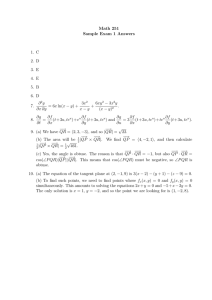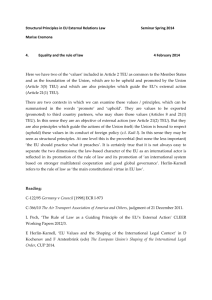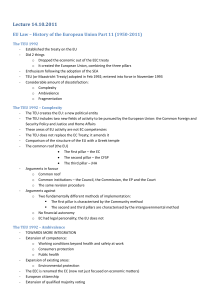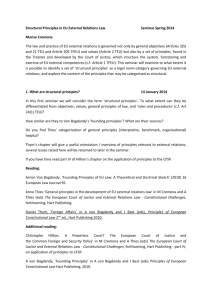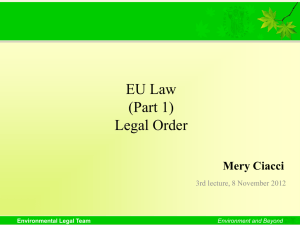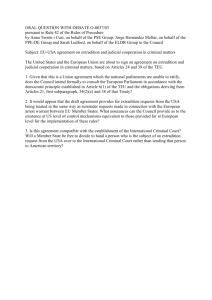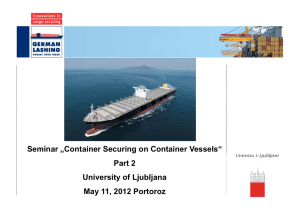Handout
advertisement
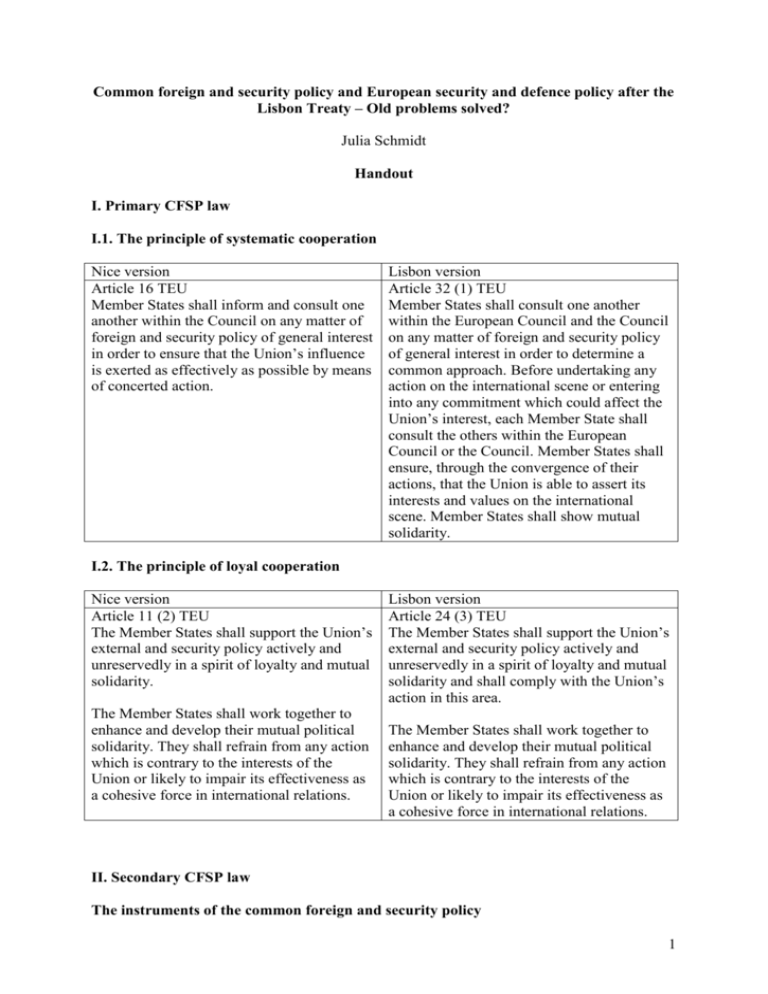
Common foreign and security policy and European security and defence policy after the Lisbon Treaty – Old problems solved? Julia Schmidt Handout I. Primary CFSP law I.1. The principle of systematic cooperation Nice version Article 16 TEU Member States shall inform and consult one another within the Council on any matter of foreign and security policy of general interest in order to ensure that the Union’s influence is exerted as effectively as possible by means of concerted action. Lisbon version Article 32 (1) TEU Member States shall consult one another within the European Council and the Council on any matter of foreign and security policy of general interest in order to determine a common approach. Before undertaking any action on the international scene or entering into any commitment which could affect the Union’s interest, each Member State shall consult the others within the European Council or the Council. Member States shall ensure, through the convergence of their actions, that the Union is able to assert its interests and values on the international scene. Member States shall show mutual solidarity. I.2. The principle of loyal cooperation Nice version Article 11 (2) TEU The Member States shall support the Union’s external and security policy actively and unreservedly in a spirit of loyalty and mutual solidarity. The Member States shall work together to enhance and develop their mutual political solidarity. They shall refrain from any action which is contrary to the interests of the Union or likely to impair its effectiveness as a cohesive force in international relations. Lisbon version Article 24 (3) TEU The Member States shall support the Union’s external and security policy actively and unreservedly in a spirit of loyalty and mutual solidarity and shall comply with the Union’s action in this area. The Member States shall work together to enhance and develop their mutual political solidarity. They shall refrain from any action which is contrary to the interests of the Union or likely to impair its effectiveness as a cohesive force in international relations. II. Secondary CFSP law The instruments of the common foreign and security policy 1 In order to pursue the objectives of a common foreign and security policy, the Treaty of Nice mentions five different instruments, consisting of the definition of the principles of and general guidelines for the common foreign and security policy; common strategies, joint actions, common position and the strengthening of systematic cooperation between the member states, Article 12 TEU. Over the past few years, practice has also led to the development of decisions sui generis. Additionally, there is the possibility of the conclusion of international agreements, Article 24 TEU. The Lisbon Treaty introduces some modest changes. The instruments to implement the CFSP stop to include common strategies. The terms common positions and joint actions have been deleted but the instruments as such still exists. Nice version Article12 TEU The Union shall pursue the objectives set out in Article 11 by: - Defining the principles of and general guidelines for the common foreign and security policy, - Deciding on common strategies, - Adopting joint actions, - Adopting common positions, - Strengthening systematic cooperation between the Member States in the conduct of policy. Lisbon version Article 25 TEU The Union shall conduct the common foreign and security policy by: (a) defining the general guidelines : (b) adopting decisions defining: (i) actions to be undertaken by the Union: (ii) positions to be taken by the Union: (iii) arrangements for the implementation of the decisions referred to in points (i) and (ii): and by (c) strengthening systematic cooperation between the Member States in the conduct of policy. II.1. Joint actions / operational decision (Council decisions defining actions to be undertaken by the Union) Nice version Article 14 TEU (1) The Council shall adopt joint actions. Joint actions shall address specific situations where operational action by the Union is deemed to be required. They hall lay down their objectives, scope, the means to be made available to the Union, if necessary their duration, and the conditions for their implementation. (2) If there is a change in circumstances having a substantial effect on a question subject to joint action, the Council shall Lisbon version Article 28 TEU (1) Where the international situation requires operational action by the Union, the Council shall adopt the necessary decisions. They shall lay down their objectives, scope, the means to be made available to the Union, if necessary their duration, and the conditions for their implementation. If there is a change in circumstances having a substantial effect on a question subject to such a decision, the Council shall review the principles and objectives of that decision and 2 review the principles and objectives of that action and take the necessary decisions. As long as the Council has not acted, the joint action shall stand. take the necessary decisions. (2) Decisions referred to in paragraph 1 shall commit the Member States in the positions (3) they adopt and in the conduct of their Joint actions shall commit the Member States activity. in the positions they adopt and in the conduct of their activity. (4) In cases of imperative need arising from (6) changes in the situation and failing a review In cases of imperative need arising from of the Council decision as referred to in changes in the situation and failing a Council paragraph 1, Member States may take the decision, Member States may take the necessary measures as a matter of urgency necessary measures as a matter of urgency having regard to the general objectives of having regard to the general objectives of the that decision. The Member State concerned joint action. The Member State concerned shall inform the Council immediately of any shall inform the Council immediately of any such measures. such measures. (5) (7) Should there be any major difficulties in Should there be any major difficulties in implementing a decision as referred to in this implementing a joint action, a Member State Article, a Member State shall refer them to shall refer hem to the Council which shall the Council which shall discuss them and discuss them and seek appropriate solutions. seek appropriate solutions. Such solutions Such solutions shall not run counter to the shall not run counter to the objectives of the objectives of the joint action or impair its decision referred to in paragraph 1 or impair effectiveness. its effectiveness. II.2. Common positions / Union positions Nice version Article 15 TEU The Council shall adopt common positions. Common positions shall define the approach of the Union to a particular matter of a geographical or thematic nature. Member States shall ensure that their national policies conform to the common positions. Lisbon version Article 29 TEU The Council shall adopt decisions which shall define the approach of the Union to a particular matter of a geographical or thematic nature. Member States shall ensure that their national policies conform to the Union positions. II.3. International agreements Nice version Article 24 TEU (1) When it is necessary to conclude an agreement with one or more States or international organisations in implementation of this title, the Council may authorise the Lisbon version Article 37 TEU The Union may conclude agreements with one or more States or international organisations in areas covered by this Chapter. 3 Presidency, assisted by the Commission as appropriate, to open negotiations to that effect. Such agreements shall be concluded by the Council on a recommendation from the Presidency. (5) No agreement shall be binding on a Member States whose representative in the Council states that it has to comply with the requirements of its own constitutional procedure; the other members of the Council may agree that the agreement shall nevertheless apply provisionally. Article 216 TFEU (1) The Union may conclude an agreement with one or more third countries or international organisations where the Treaties so provide or where the conclusion of an agreement is necessary in order to achieve, within the framework of the Union’s policies, one of the objectives referred to in the Treaties, or is provided for in a legally binding Union act or is likely to affect common rules or alter their scope. (2) Agreements concluded by the Union are binding upon the institutions of the Union and on its Member States. 4
